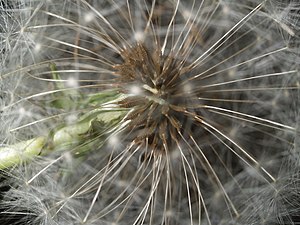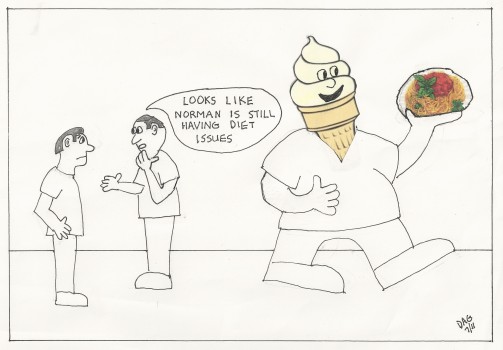
Image via Wikipedia
I had an interesting comment a couple of days ago on the concept of Life-ers.
If you have a weed in your garden, you pull it. If there’s something wrong in your life, you don’t fall in love with it. You get to weeding.
However, there are Life-ers that are both weeds to pull and weeds to just plain garden I reckon.
We here at FriendtoYourself.com, got one of the most practical life examples of a Life-er. It is both one that can be weeded and one that cannot. Emily said in response to blog-post, One Woman’s Struggle,
…I have been a self-identified compulsive overeater (or binge eater) since I was a child. It has always loomed large (pun intended) in my life. I have successfully dieted and lost 30-40 pounds at a time, and then I’ve gained everything back — with interest. It has been my obsession and my bete noir.
Eight years ago, out of pure desperation, I went to a Overeaters Anonymous meeting. I didn’t necessarily like it at first, but I recognized my problem as an addiction. If you hold my experience up next to an alcoholic’s, there is no difference. I struggled a long time with the program, but today I am living what OA calls an abstinent life. My definition of abstinence is three reasonable meals a day with nothing in between. I am shrinking to a healthy body weight.
I have also developed my spiritual side and my relationship with my higher power (that I get to define) is what makes it possible to eat like a normal person. My obsession has been lifted, one day at a time. Like an alcoholic, this is not something I can do on my own. This is supported by about 25 years of data.
I am experiencing freedom I couldn’t even imagine walking in the doors of my first meeting — freedom from fat, freedom from compulsion, openness to change and growth and a life that is no longer nearly as self-centered.
Sana, you asked if it helps to think of it as an addiction — for me, it’s not an analogy; it IS an addiction. I use the Big Book for the solution. My recovery is just like that in any other program. And it’s the ONLY thing that made a difference — not just for me, but for the dozens of people I share OA with. I hope this is something health professionals will understand one day. OA is an underutilized tool, and I think that could change with better understanding and guidance.
Thank you Emily for your story. I haven’t been able to get you out of my mind.
Addictions is a weed we could more often agree is a Life-er. That is not to say there are not those of us who think that they can yank and be done with, but the general consensus in medicine is that addictions are Life-ers.
There are other Life-ers besides addictions. Recurrent major depressive disorder, treatment resistant major depressive disorder, obsessive compulsive disorder, okay – a gazillion other medical illnesses that will not be eradicated by weed killer or a gloved garden-grip. There are also non-medical Life-ers, such as poverty, natural or unnatural disaster, stigma and so forth. We could even use the biopsychosocial model to catalogue them if we wanted.
One of the things that intuitively sits poorly about Life-ers in our culture and communities is the perceived helplessness that can soil it. However, we are not implying helplessness at all. The opposite in fact. Just as this courageous Emily described, when we take care of ourselves, when we befriend ourselves, we take accountability for where we are now, our yards improve neighborhoods. We have more freedom and choice.
For the world out there who is scared to garden over the long term, let’s get over ourselves. What we are growing is worth the space we occupy and of high value. You may never know it but we are and have bank to show for it.
Questions: What is your response to those who call your Life-ers weeds to pull? What are some examples of Life-ers you have fallen in love with and how did you? How do you get away from perfectionism? Please tell us your story.
Self-Care Tip – If there is a weed in your life you can pull, pull it. If you cannot, or if you do and it just keeps growing back, fall in love with it and grow a garden with those perdy dandelions.
Related articles
- Why Your Diet May Not Be Working (diet-blog.com)
- Life-ers – Our Beloved Flaws (friendtoyourself.com)
- One Woman’s Struggle To Shed Weight, And Shame (friendtoyourself.com)
- I Am An Oxymoron. I Am a Christian Psychiatrist. (friendtoyourself.com)
- In Mass and Individually, We Are Beautiful – Lady Gaga (friendtoyourself.com)
- Impressed by Weeds (nytimes.com)
- Fear and Loving (mslovenhappiness.wordpress.com)



